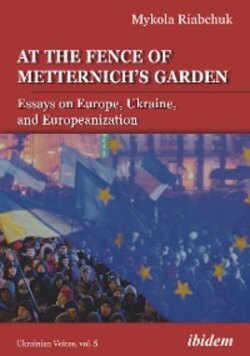Читать книгу At the Fence of Metternich's Garden - Mykola Riabchuk - Страница 12
A long way ahead
ОглавлениеDuring the Orange Revolution in Ukraine, the West—in both national and international terms—scored a victory. In geopolitical terms, Ukraine’s further European advance might be as important as Turkey’s. In one case, the whole Muslim world would see that “Islam is compatible with secular democracy” (The Wall Street Journal, 8 February 2005). In the other case, the entire post-Soviet world, including Russia, will see that the Soviet legacy can be overcome, the post-Soviet “void of values” filled, and “disintegration of all levels of society” recovered from [Langer 2004].
The regime change that occurred in Ukraine at the end of 2004, and the EU enlargement that made Ukraine an immediate neighbor of the EU since May 2004, urged both sides to reconsider their relations in both practical and conceptual terms. The revision would not be a simple task since the ‘big-bang’ had been planned long ago, with all the adjacent policies and documents, while the Orange revolution occurred unexpectedly, at least for the Europeans, brining many more difficult questions than easy answers to the agenda.
Ukrainians may once again become the ‘unwanted step-children’ of some grand continental events, this time—of the Great East European Revolution that swept away authoritarian regimes west of Ukraine in 1989 but reached Kyiv only with a regretful 15-year delay. The new Ukrainian authorities are supposed to take a pragmatic stance vis-à-vis the EU. On the one hand, they could and probably should remain critical of the EU policy towards Ukraine, pointing out, exactly as their predecessors, its short-sightedness and duplicity. Yet on the other hand, they should accept the proposed programs and mechanisms of cooperation, however feeble and superficial, and—unlike their predecessors—make proper use of these programs, putting an end to a weird ambiguity, at least on the Ukrainian side.
In other words, they should put the ball in the EU’s court by completing all the required reforms and programs and exposing thereby the EU’s inadequate, biased and double-standard approach to Ukraine—as long as the EU denies Ukraine’s membership aspirations but accepts Turkish, Albanian, and Macedonian bids. At the moment, it seems to be the only option available for Ukrainians—to work hard, to improve the country’s image, and to press the West diplomatically with a hope that even the most reluctant Europeans will sooner or later run out of excuses for keeping a reformed and dynamic country outside.
It would take much time and even more effort from both Ukrainians and Europeans to come to terms with some simple truths and complicated reality. So far, the Ukrainian stance articulated by the President’s first aide looks quite measured and reasonable: “We agreed not to say ‘tomorrow’ while they [EU leaders] agreed not to say ‘never’.” It looks promising that the person assigned to coordinate Ukraine’s European integration began with sober self-criticism rather than anti-Brussels complaints and self-indulgence. “We have just entered the elementary school,” he reprimanded his fellow-countrymen half-jokingly, “and right away demand the university diploma!” (Ukrayinska pravda, 21 February 2005).
The best answer the Europeans can make to this stance has been unofficially (as yet) formulated by the Polish President Aleksander Kwasniewski: “There is no argument not to open negotiations with Ukraine. The question is of time, of procedures, but not why or if” (United Press International, 2 February 2005). Giscard d’Estaing and his colleagues may have a different opinion, but it is up to Ukrainians to prove they are wrong.
2005
1 Quoted in “New Neighbourhood—New Association. Ukraine and the European Union at the beginning of the 21st century,” Policy Papers 6. Warsaw: Stefan Batory Foundation (March 2002): 11.
2 As reported by Varfolomeyev, O. 2002. “The EU’s Unwanted Stranger?” Transition Online. July 12.
3 Symptomatically, the geopolitical preferences of both Ukrainians and Russians in western Ukraine clearly differ from the geopolitical preferences of both Ukrainians and Russians in the east. In other words, “regional rather than ethnic affiliation determines geopolitical preferences” (Reznik, O. 2001. “Zovnishniopolitychni oriyentatsiyi naselennia,” in Vorona, V., Shulha, M. (eds.), Ukrayinske suspilstvo: desiat rokiv nezalezhnosti. Kyiv: Instytut sotsiolohiyi NANU: 243.
